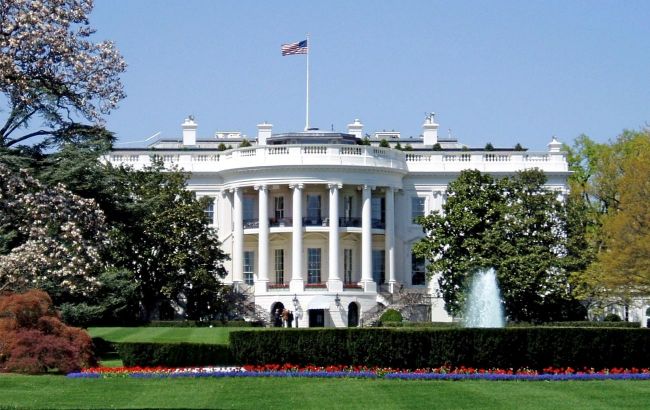Not just Trump and Harris: Other US presidential candidates and their impact on election
 The White House (photo: Wikipedia)
The White House (photo: Wikipedia)
Although the US presidential race is currently focused on Kamala Harris and Donald Trump, other candidates are also running.
Below, RBC-Ukraine explains how they can influence the election results
Content:
- How third-party candidates might influence the election
- Robert F. Kennedy Jr.
- Chase Oliver – anti-Trump
- Cornel West – leftist thinker
- Jill Stein – environmental activist
In the US elections, most attention is concentrated on the two main candidates: Kamala Harris of the Democrats and Donald Trump of the Republicans. However, they are not the only ones vying for the presidency.
How third-party candidates might influence the election
Third-party candidates' ratings are in the single digits, and they may not even run in all states. Each state has unique and sometimes convoluted election laws. Third-party candidates can run as independents or representatives of minor parties, primarily the Green Party or the Libertarian Party. The procedures vary in complexity and timing.
Nonetheless, these candidates can impact the election results by siphoning off votes. For example, in 1992, independent candidate Ross Perot received 19% of the vote. Analysts believe this siphoned votes from George H. W. Bush and helped Bill Clinton win. In 1912, former President Theodore Roosevelt ran on a newly formed Progressive Party ticket and finished second with 27.4% of the vote.
Third-party candidates are particularly significant in swing states where the gap between Kamala Harris and Donald Trump is within the margin of error.
According to the latest Reuters/Ipsos poll, in seven states where the 2020 election was closest — Wisconsin, Pennsylvania, Georgia, Arizona, North Carolina, Michigan, and Nevada — Trump had 45% compared to Harris's 43%. Meanwhile, a Bloomberg News/Morning Consult poll released on August 30 showed Harris either leading or tied with Trump in each of these states.
There are four most prominent third-party candidates.
Robert F. Kennedy Jr.
A nephew of former President John F. Kennedy, Robert F. Kennedy Jr. initially gained prominence as an environmental lawyer but later became known as a proponent of conspiracy theories and anti-vaccine rhetoric.
Kennedy first entered the race in April 2023, challenging President Joe Biden in the Democratic primaries. When it became clear that the party would not support him, he decided to run independently.
During his campaign, Kennedy appealed to voters dissatisfied with both the Democratic and Republican parties. He frequently criticized both Biden and Trump for increasing government spending, prolonging US involvement in foreign conflicts, and pursuing policies favorable to large corporations.
Kennedy promised to end US support for Ukraine and negotiate an end to the Russia-Ukraine conflict. He also pledged to implement a five-year ban on lobbying for former government officials and proposed an executive order on his first day in office to dismiss any federal employee who lies.
On August 23, Kennedy effectively suspended his candidacy and endorsed Donald Trump. However, he will remove his name from the ballot in only ten states likely to decide the election and remain a candidate in other states. Kennedy has joined Trump’s transition team to assist with key appointments in case of a Trump victory.
With a national rating of around 3% in recent months, Kennedy’s withdrawal from the race is most advantageous to Trump. Some of Kennedy’s supporters may vote for Trump, hoping their candidate will secure a position in the administration, while others may not vote at all.
Chase Oliver – anti-Trump
The Libertarian Party candidate, 38-year-old Chase Oliver, will be the youngest participant in the presidential race and is the only openly gay candidate.
His campaign promoted ideas of civil liberties and enhanced local governance. Oliver primarily criticizes Trump for increasing the national debt and implementing COVID-19 lockdowns during his previous presidency. Interestingly, such rhetoric indirectly benefits Trump, as Oliver siphons votes from Kamala Harris.
In a recent Monmouth University poll, 1% of Democrats indicated they would support Oliver, compared to nearly no support among Republicans.
Cornel West – leftist thinker
Cornel West, a 70-year-old professor and one of America’s most influential leftist thinkers, is known for his advocacy for minority civil rights and criticism of large corporations and neoliberalism. He has acted in several films, including The Matrix Reloaded and The Matrix Revolutions. West initially planned to run with the Green Party but decided to run independently.
A key point of his platform is to end all armed conflicts where the US supports one side, including the Russia-Ukraine war and the Israel-Hamas conflict. West also advocates for the dissolution of NATO.
A recent ABC News and Ipsos poll showed West has the support of about 1% of Democratic voters. He might attract more left-leaning youth dissatisfied with the Democratic Party’s support for Israel.
Jill Stein – environmental activist
Jill Stein, a 73-year-old Harvard graduate, ran for US president with the Green Party in 2012 and 2016 and previously attempted to become Governor of Massachusetts twice. She has been active in activism since the late 1990s.
Stein advocates for a climate policy that goes beyond the Green New Deal proposed by progressive Democrats, urging the US to achieve net-zero carbon emissions more rapidly. She also proposes closing most US military bases abroad and ending arms supplies. Another of her proposals is to lift economic sanctions that harm civilian populations, including those imposed on Cuba, Venezuela, and Nicaragua.
Like West, Stein has a national rating of around 1%. However, a Marquette University Law School poll showed she received 6% of votes from swing Democrats, her highest level of support among any partisan group. She received no support from any Republican group. Among American Muslims, her support is at 29%, the same as Harris’s. This voter category, totaling 2.5 million people in the US, is particularly important in the swing state of Michigan, where Arab-Americans are concentrated.
In some states, Democrats are trying to counteract the nomination of third-party candidates to prevent them from siphoning votes from Kamala Harris. For example, in Wisconsin, Democratic National Committee staffer David Strange attempted to remove Stein from the ballot through the courts because the Green Party lacked representation in the state. The court refused to remove Stein. Following the incident, Stein stated she would continue her campaign and not withdraw her candidacy until the election.
Sources: public opinion polls and statements from American politicians.
Earlier, RBC-Ukraine reported on how US presidential candidates are using issues of illegal immigration and the rising cost of living for Americans.

